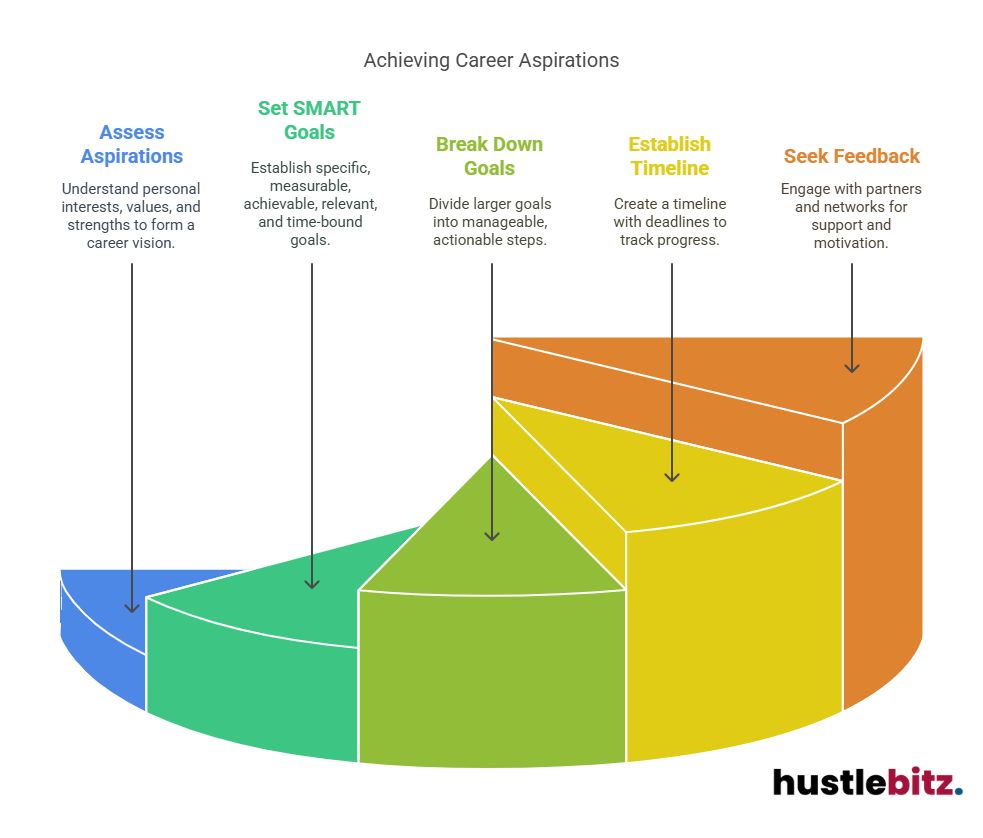Goal setting is crucial for career advancement. Start by identifying your aspirations and aligning them with industry trends. Use the SMART criteria to structure your goals: ensure they are Specific, Measurable, Achievable, Relevant, and Time-bound. Break these goals into actionable steps and create a timeline to track your progress. Regularly assess your performance and adjust your strategies as necessary. Connecting with mentors and building a support network can also amplify your growth. By following these steps, you can effectively pave your path toward professional success. Discover additional strategies that can further enhance your journey toward career advancement.
Key Takeaways
- Understand your career aspirations by assessing your interests, values, and strengths to create a long-term vision.
- Set SMART goals to provide a clear roadmap for your professional development and measure progress effectively.
- Break down larger goals into actionable steps, allocating necessary resources and utilizing time management techniques for efficiency.
- Establish a timeline with deadlines for each milestone to maintain momentum and track your progress.
- Seek feedback and support from accountability partners and professional networks to enhance growth and motivation.

Understanding Career Advancement

Understanding career advancement involves recognizing the strategic steps necessary to elevate one’s professional standing and achieve long-term goals within a chosen field. To successfully navigate this journey, individuals must first identify their desired career paths. This involves assessing personal interests and aligning them with industry trends to ensure relevance in the job market.
Skill development is paramount; acquiring new competencies enhances employability and prepares professionals for future challenges. Engaging in professional certifications can further validate expertise, making candidates more attractive to potential employers.
Equally important are networking strategies, as building relationships within one’s industry can open doors to mentorship opportunities and valuable insights. Personal branding plays a crucial role in career advancement. By effectively communicating one’s unique value proposition, individuals can distinguish themselves in a competitive landscape.
Additionally, demonstrating leadership qualities is essential for those aspiring to move into managerial roles. This includes not only technical skills but also soft skills such as emotional intelligence, adaptability, and effective communication.
Maintaining a work-life balance is vital throughout this process. Striking a harmonious balance allows professionals to avoid burnout while remaining committed to their growth.
Ultimately, understanding career advancement requires a holistic approach that encompasses skill enhancement, relationship building, and self-promotion, all while being attuned to the evolving job market. By intentionally navigating these facets, individuals can position themselves for sustained success in their chosen fields.
The Importance of Goal Setting
Goal setting is a critical component of career advancement, as it provides a clear roadmap for individuals to identify their aspirations and measure their progress along the way.
By establishing specific, measurable objectives, professionals can cultivate personal motivation and maintain focus on their career vision. Goal setting also facilitates long-term planning, ensuring that individuals not only envision their future but also actively pursue it.
Here are three key benefits of effective goal setting:
- Skill Development: Clear goals prompt individuals to identify the skills they need to cultivate for their desired roles, fostering a culture of continuous professional growth.
- Networking Opportunities: By setting goals that involve expanding one’s professional network, individuals can create valuable connections that may lead to mentorship opportunities, further enhancing their career trajectory.
- Work-Life Balance: Goal setting encourages individuals to prioritize their time, allowing them to align their professional ambitions with personal commitments, ultimately supporting a healthier work-life balance.
Employing self-assessment tools can aid in monitoring progress toward these goals, fostering a success mindset essential for overcoming challenges.
Additionally, recognizing the importance of mentorship can guide individuals in refining their objectives and strategies.
Identifying Your Career Aspirations

Regularly assessing your interests, values, and strengths is essential for effectively identifying your career aspirations.
Begin by reflecting on your career interests and personal values. Understanding what excites you professionally can help shape a long-term vision that aligns with your passions and goals. Consider engaging in passion projects that resonate with your interests, as they can provide valuable insights into what you truly enjoy.
Next, evaluate your current skills and identify areas for skill development. This process is crucial for enhancing your employability and aligning your capabilities with industry trends. Seek out educational opportunities, such as workshops or courses, to further your knowledge and expertise.
Networking strategies play a pivotal role in career advancement. Build connections with professionals in your field, as they can offer mentorship benefits and guidance based on their own experiences. Mentorship can be invaluable in helping you navigate challenges and uncover new opportunities.
As you explore these avenues, remember to consider work-life balance. Your career aspirations should harmonize with your personal life, ensuring that you can thrive both professionally and personally. By integrating your personal values into your career strategy, you can create a fulfilling path that resonates with who you are.
Ultimately, the process of identifying your career aspirations is ongoing. Regularly revisiting your goals and aspirations will help you stay aligned with your evolving interests and the dynamic nature of the workforce.
Setting SMART Goals
Developing a clear framework for your aspirations can significantly enhance your ability to set and achieve SMART goals—goals that are Specific, Measurable, Achievable, Relevant, and Time-bound. By adhering to the SMART criteria, you can ensure your goals are aligned with your professional development and personal aspirations.
To effectively set SMART goals, consider the following:
- Specific Targets: Define exactly what you want to achieve. Instead of a vague goal like ‘improve skills,’ specify ‘complete a project management course within the next three months.’
- Measurable Outcomes: Establish performance metrics that allow you to track your progress. For instance, ‘increase sales by 15% over the next quarter’ provides a clear benchmark for success.
- Realistic Expectations: Ensure that your goals are achievable within your current resources and time constraints. Setting time-bound objectives, such as ‘attend one networking event per month,’ fosters accountability and maintains personal motivation.
Breaking Goals Into Actionable Steps

Breaking down larger objectives into actionable steps is essential for maintaining focus and ensuring steady progress toward your career advancement aspirations. To do this effectively, begin by identifying actionable milestones that align with your overarching goals. These milestones can be divided into priority tasks, allowing you to concentrate on what is most important and manageable.
Resource allocation plays a crucial role in this process. Determine what resources—such as time, finances, and tools—are necessary for each task. Utilize time management techniques to schedule these tasks efficiently, ensuring that you dedicate adequate time for skill development and networking strategies. Developing new skills is vital for career growth, so prioritize training or educational opportunities that enhance your capabilities.
To maintain motivation, consider involving accountability partners. These individuals can help keep you on track, providing support and feedback as you navigate your path. Establish performance metrics to evaluate your progress, allowing for adjustments as needed. Regularly assess your achievements against these metrics to stay aligned with your goals.
Barrier identification is also critical; recognize potential obstacles that may hinder your progress and create strategies to overcome them. By systematically breaking down your goals into these actionable steps, you establish a clear roadmap for success. This method not only enhances your focus but also reinforces your commitment to achieving your career advancement objectives.
Creating a Timeline for Achievements

Establishing a timeline for your achievements is vital for tracking progress and maintaining momentum as you pursue your career advancement goals. A well-structured timeline not only helps in identifying key milestones but also facilitates effective resource allocation and prioritization of actions required for skill development and personal branding.
To create an effective timeline, consider the following steps:
- Identify Timeline Milestones: Break down your career goals into manageable milestones. These may include completing specific training programs, enhancing your professional networking, or achieving targeted performance evaluations.
- Set Achievement Deadlines: Assign clear deadlines to each milestone. This encourages accountability and fosters a sense of urgency, ensuring that you remain focused on your objectives.
- Establish Progress Checkpoints: Regularly evaluate your progress against your timeline. This could involve reviewing your advancement every quarter to assess the effectiveness of your motivation strategies and to adjust your career mapping as necessary.
Tracking Your Progress

Monitoring your progress is essential for ensuring that you stay aligned with your career advancement goals and can make necessary adjustments along the way. Establishing clear progress metrics allows you to evaluate your achievements objectively. Utilize self-assessment tools to gain insights into your current skills and identify areas for improvement. Regularly reviewing these metrics will guide your decision-making and keep you on track.
Incorporating milestone celebrations is a great way to acknowledge your accomplishments, no matter how small. These celebrations serve as motivation and reinforce your commitment to continuous skill development. Collaborating with accountability partners can also enhance your progress; they provide support and encouragement while helping you stay focused on your goals.
Performance reviews are another crucial aspect of tracking your progress. These assessments not only highlight your achievements but also spotlight areas where adaptive strategies may be necessary. Using tracking software can streamline this process, allowing you to visualize your progress over time and identify patterns that may inform your next steps.
Engaging in journal reflections can provide a deeper understanding of your experiences and growth. Reflecting on your journey can help you pinpoint effective methods and strategies while offering insights for future endeavors.
Lastly, employing progress visualization techniques can help you maintain clarity and motivation as you work towards your career advancement goals. By integrating these methods, you can effectively monitor your journey, adapt when necessary, and ultimately achieve the success you desire.
Seeking Feedback and Support

Actively seeking feedback and support from colleagues and mentors is vital for enhancing your professional development and refining your career advancement strategies. Establishing strong feedback loops not only fosters open communication but also encourages continuous improvement through constructive criticism. This process can be facilitated through various avenues, such as peer mentorship and performance reviews.
To maximize the benefits of feedback and support, consider the following strategies:
- Identify Accountability Partners: Partner with colleagues who share similar career goals. Regular discussions can help maintain motivation and provide a platform for honest feedback.
- Leverage Employee Resources: Utilize available resources, such as coaching opportunities and professional development workshops, to gain insights from experienced professionals. These resources can enhance your skills and broaden your network.
- Build Support Networks: Create a network of trusted individuals who can provide diverse perspectives. Engaging with this network can lead to invaluable advice and a deeper understanding of your career path.
Final Thoughts
Effective goal setting is a cornerstone of career advancement, offering a structured approach to achieving professional success. By understanding and applying the SMART criteria—Specific, Measurable, Achievable, Relevant, and Time-bound—individuals can transform their aspirations into actionable plans. Breaking down goals into manageable steps, establishing clear timelines, and regularly assessing progress ensures continuous growth and alignment with career objectives. Seeking feedback and building supportive networks further enriches the journey, providing valuable insights and encouragement. Embracing these strategies will not only guide you towards your career goals but also foster a proactive mindset and adaptability in a dynamic professional landscape.




